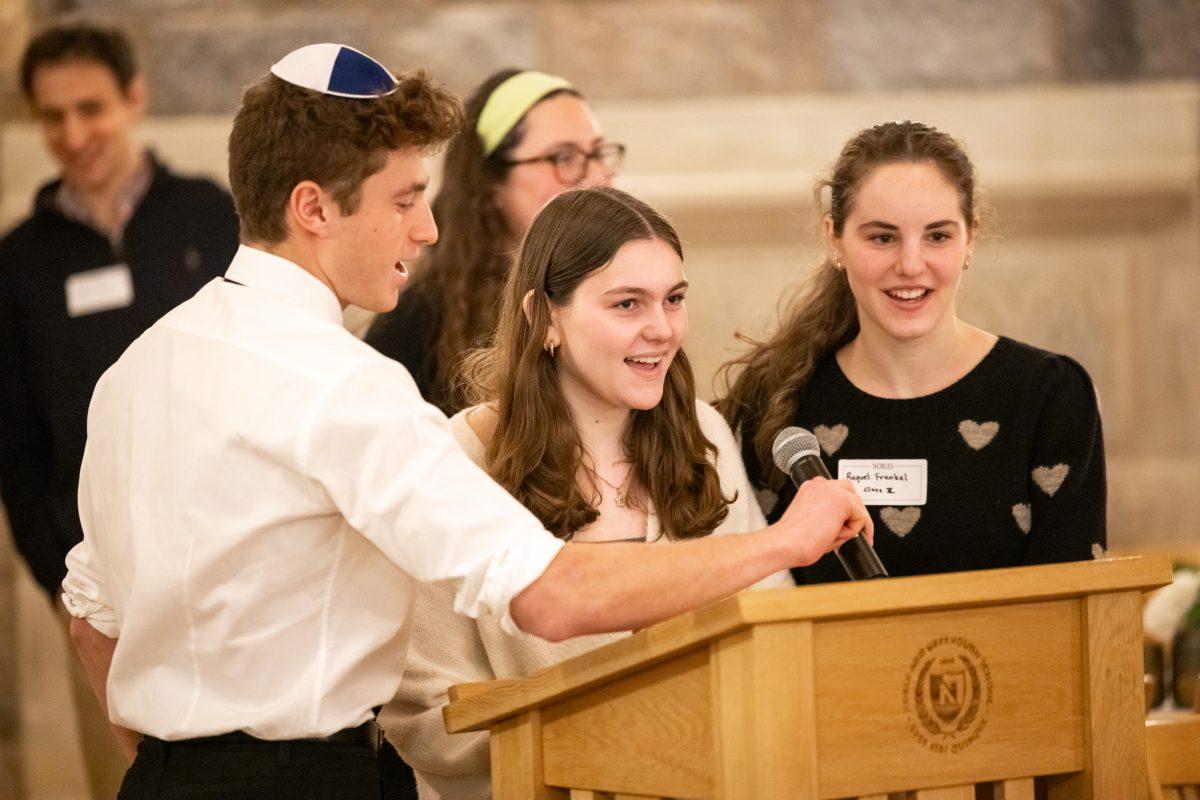
Eli Schotland, Staff Writer
February 9, 2024
“Shabbat Shalom!” Some of you may have heard these words uttered by Jewish friends or classmates on Friday evenings. But what do they mean? “Shabbat Shalom” is the traditional greeting exchanged by Jews on Friday nights before Shabbat. Shabbat is a Jewish festival that marks the end of the week. In the Old Testament of the Bible, which Judaism views as its central text, it is said that God created the world in six days. On the seventh day, or Saturday, he rested, and so many Jews rest on that day as well. Some Orthodox Jews refrain from any work-related activities, even going so far as to wear clothing without buttons or zippers and asking neighbors to turn on light switches or press elevator buttons for them. Before Shabbat begins, Jews often hold celebrations with lots of food and the lighting of candles.
Our own 5th Annual Nobles Shabbat Dinner was no different. The event was hosted in Loring Dining Hall, where tables were overlaid with lovely white tablecloths. Students and their families were in high spirits throughout the evening. Many delicious dishes were served. My favorite has to have been the macaroons. Macaroons are a type of pastry made with sugar, egg whites, and almonds or coconuts. Originally a food of French monks, Jews adopted the yeastless food, since Jews are prohibited from consuming leavened bread (made with yeast) during the religious holiday of Passover. FLIK’s macaroons were some of the best I’ve ever had. Sorry Bubbe (grandmother)! Many students wore Nobles-branded kippot (sg. kippah), also known as skullcaps. Kippot are little cloth caps worn by some Jews during religious events or festivities. The kippot that were provided at the dinner were donated several years ago by a parent. Intentionally, the kippot were not labeled with the year so that they could be reused again and again. Unfortunately, our supply is beginning to run low, but Librarian Sokoll remains confident that more can be ordered as needed. I tried to rock a kippah, but my hair did not cooperate, and my kippah kept falling off. Typically, I bring a barrette clip to keep it on, but I didn’t have one that evening.
The planning for the Shabbat dinner is complex and involves many people from different parts of the Nobles community. Last year, Librarian Sokoll, a faculty advisor of Kehilla, began planning for the event a year in advance. They first worked to find a time: “We try to look at a date when graduates will likely be home, so usually that’s why it’s in early January.” Then, during early fall, the Kehilla faculty reached out to parents of Jewish students to arrange the event. Librarian Sokoll highlighted the important role that parents play in helping to organize the event, saying, “[Parents] provide some of the additional things that we don’t have as a school: the grape juice, the challah, the centerpieces, things like that.” After that, the order of the evening was developed in conjunction with the senior leaders of Kehilla. Both the faculty and the student leaders wrote speeches that they eloquently delivered at the dinner.
Senior Kehilla leaders Asher Bernstein (Class I) and The Nobleman’s very own Joshua Levine (Class I) spoke about their experiences leading Kehilla and being Jewish at Nobles. Jewish faculty and Kehilla Faculty Advisors Talya Sokoll, Michael Kalin, and Michael Polebaum (N ‘08) gave moving speeches. Notable Jewish alums such as Noa Fay (N ‘19), Alex Janower (N ‘22), and Molly Hughes (N ’23) were present.
We sang the Kiddush and Hamotzi, the prayers for wine and bread, respectively. Kehilla Katana (little community), the Middle School’s Jewish affinity group, led one of the prayers. Naturally, since every student in the room was underage, delectable grape juice was substituted for the traditional wine. FLIK provided us with delicious challah (Jewish bread). Challah is not typically cut with a knife and is instead torn into pieces by hand. I happily ripped a whole loaf to shreds and ate it by myself.
To sum up, it was a great evening and a very enjoyable celebration. I encourage everyone who identifies as Jewish to attend next year and to bring their families. Kehilla means “community” in Hebrew. As someone who is (half) Jewish, the community that Kehilla creates in so many different ways is really important to me. From large events like the Shabbat Dinner to our fun, casual meetings during the school day, it’s a great way to connect and make friends. To everyone at Nobles who can, I suggest you take advantage of the wonderful opportunities provided by whatever affinity spaces you identify with. Shabbat Shalom!
(Photo Credit: Ben Heider)